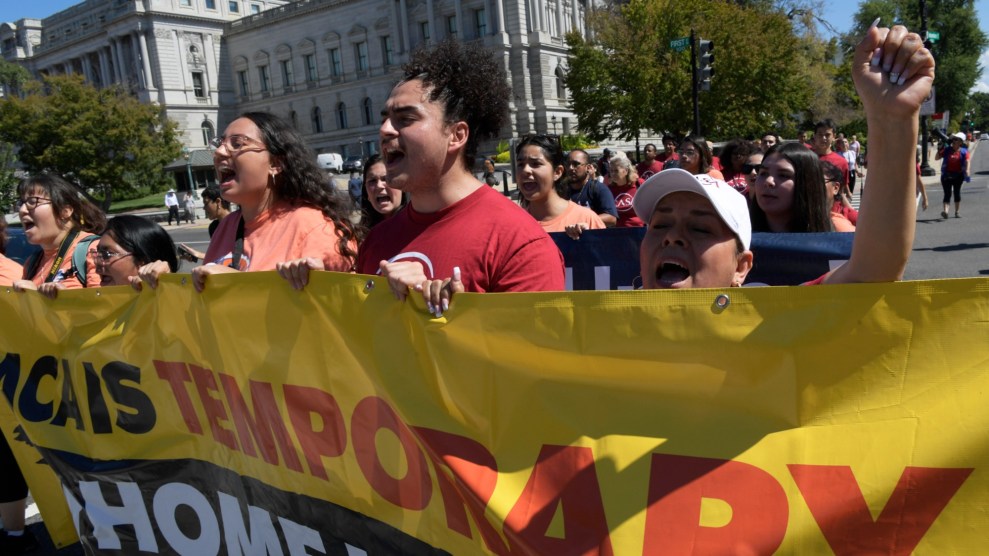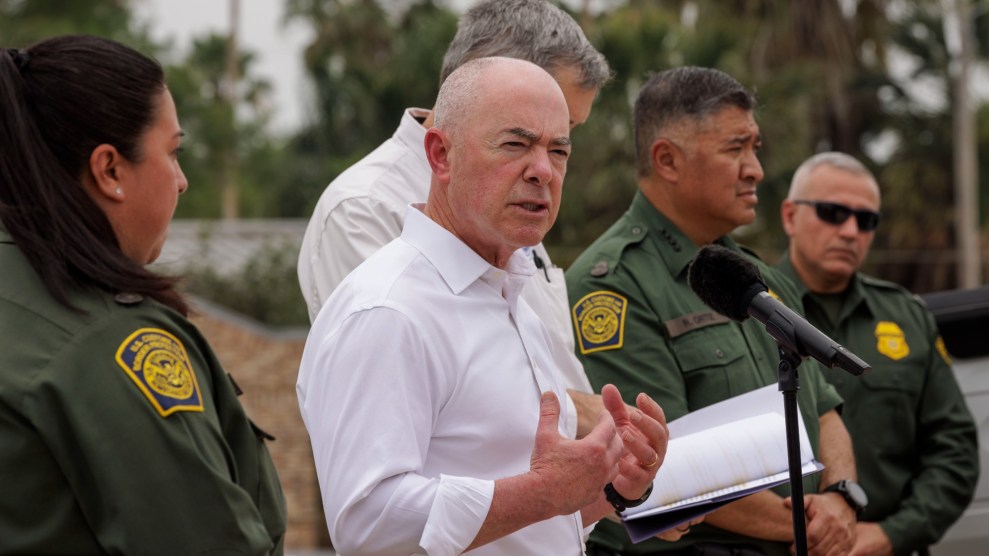
DACA recipient and allies from United We Dream protest ruling from Judge Hanen.Lenin Nolly/NurPhoto/ZUMA
Twelve years ago, when former President Barack Obama proudly created the Deferred Action for Childhood Arrivals (DACA) program to shield undocumented youth from the threat of deportation, all involved thought of it as a temporary fix. It would be, as Obama said, a “stopgap measure.” Eventually, everyone assumed Congress would get together and pass legislation for the so-called Dreamers brought to the country as children.
But, as I’ve written about before—despite the seeming bipartisan consensus of the time and DACA’s outsized weight on the lives of the 800,000 undocumented young people who have benefited from it and built their lives in the United States—the long-envisioned legislative agreement that would have afforded DACA recipients a pathway to citizenship never came to be.
Now, the prospects of a bill to help Dreamers seem grim. Both presidential candidates are more focused on talking up border security. And this year, when Democrats supported a proposed bipartisan immigration bill, they all but ignored the predicament of the undocumented youth as part of the discussion.
With Dreamers off the agenda, DACA has lived far past its intended transitionary period. That means recipients are stuck in legal limbo and at the mercy of presidential transitions and the whims of the judiciary.
Now, the fate of hundreds of thousands of undocumented youth sits in the hands of the Fifth Circuit Court of Appeals, arguably the most conservative jurisdiction in the nation where Trump-appointed judges are pushing the MAGA agenda to reshape the United States one radical ruling at a time.
“Living as a DACA recipient, not a day passes that I do not think about how my life could be so different if I had a permanent sense of security in my country, the only country I know,” Jose Barrera with the League of United Latin American Citizens (LULAC) said in a statement ahead of this week’s hearing. “Others who, like me, are DACA recipients try to live their lives the best they can every day, but you can’t help but feel forgotten when year after year, Congress and our elected leaders fail to resolve this issue. Our lives cannot be kept on hold forever.”
On Thursday morning, a panel of three federal judges—none of whom are Trump appointees—heard oral arguments in Texas v. United States. The case was brought by Republican-led states in 2018 challenging the legality of DACA. Outside the courthouse, DACA recipients and supporters chanted, “Home is here.”
In 2021, Texas District Court Judge Andrew Hanen ruled that Obama exceeded the executive branch’s authority in creating DACA and that the memorandum violated the rulemaking process. In so doing, Hanen blocked the processing of new applications nationwide.
After the Biden administration appealed and issued a final rule to codify DACA into federal regulation, the Fifth Circuit sided with the states and upheld the district court’s decision. The judges—one Bush and two Trump appointees—rejected the government’s argument that DACA is an appropriate exercise of prosecutorial discretion. The case then went back to the lower court, where in 2023 Hanen declared DACA unlawful. “While sympathetic to the predicament of DACA recipients and their families,” he wrote, “this Court has expressed its concerns about the legality of the program for some time.”
Twelve years after DACA’s signing, and after years of legal wrangling, the program is in a perilous place. At Thursday’s hearing in New Orleans, there were a slew of specific questions before the judges: whether the Biden administration acted within its authority when it attempted to strengthen and safeguard DACA in 2022; if the lower court’s ruling halting new applications nationally was excessive; and whether the state of Texas, a plaintiff, successfully showed evidence of harm as a result of costs associated with social services provided to DACA recipients.
The Texas v. United States case could drag for weeks or months and eventually make its way to the Supreme Court. But what happens to DACA will also hinge on the outcome of the November presidential election. While in office, Donald Trump tried to rescind the program. The Supreme Court ruled the move was “arbitrary and capricious.” (It did not address the underlying issue of DACA’s validity.) If Trump takes back the White House, Cecilia Muñoz, who served as director of the Domestic Policy Council under Obama and helped establish DACA, told me, “You can expect DACA to shrink or disappear entirely.”
On the other side, Vice President Kamala Harris, throughout her career, has voiced strong support for DACA. As she sought the Democratic nomination in 2019, Harris put forward a comprehensive plan to provide a pathway to citizenship to more than 2 million Dreamers through executive action. The roadmap, which mirrors ongoing demands from immigrant rights groups, included measures to expand DACA eligibility and the use of the so-called “parole in place” power to remove barriers preventing Dreamers with American espouses from qualifying for a green card.
“Dreamers cannot afford to sit around and wait for Congress to get its act together,” Harris said at the time. “These young people are just as American as I am, and they deserve a president who will fight for them from day one.”
It remains to be seen if she’ll honor that pledge as the 2024 Democratic nominee. So far, Harris’ commitments have been somewhat more modest. In June, on the occasion of the program’s anniversary, she vowed to “continue fighting to protect Dreamers,” but placed the responsibility of addressing the issue of a pathway to citizenship on Congress. “We can create an earned pathway to citizenship and secure our border,” she said at the Democratic National Convention in August.
At the hearing, the US government lawyer Brian Boynton and counselors for the Mexican American Legal Defense and Educational Fund (MALDEF) and the state of New Jersey defending DACA, disputed Texas’ legal standing to sue, arguing the harm the state claims to experience from health care and education costs—as well as their assertion that in the absence of the program, recipients without legal status would choose to leave the state or the country—is too indirect and speculative. (One of the judges seemed to agree, pressing the lawyer for Texas to provide concrete evidence to back up the assumption that DACA recipients would likely “self-exile.”) They also asked the court to consider the impact of the program on thousands of US citizen children whose parents have DACA, as well as on businesses across the dozens of states that benefit from it.
One of the judges also challenged Texas on the issue of whether states can rely on lower courts to “usurp” federal immigration policy. He cited a “sea change” decision by the Supreme Court last year reaffirming the executive branch’s authority to govern on immigration. Towards the end of his arguments, the Texas counsel acknowledged that they’re asking for DACA to be wound down across the country. The lawyer representing the Biden administration petitioned the court to at minimum continue to preserve DACA for the more than 500,000 current recipients.
“This case should not even be in court in the first place. DACA recipients only bring benefits to the states in which they live,” Nina Perales, the attorney arguing for MALDEF, said at a press conference afterwards. “Consistently since the very beginning of this case Texas has never been able to point to any DACA recipient that caused any harm to the state of Texas and Texas was the only state that tried.”
















